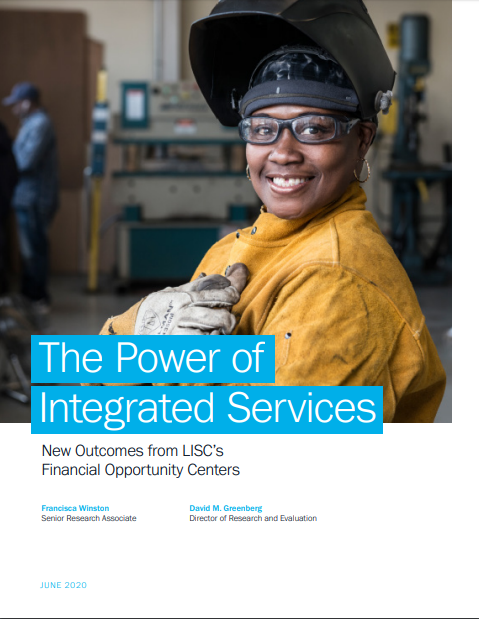A new LISC research paper, “The Power of Integrated Services: New Outcomes from LISC’s Financial Opportunity Centers,” offers data-driven proof of the efficacy of LISC’s FOC and Bridges to Career Opportunities models in supporting people on their journeys to financial wellbeing.
The public health and economic crises caused by Covid-19 have exacerbated racial inequities, and highlighted the imperative for change at the systems level, and for services at the individual level.
The pandemic has disproportionately impacted communities of color, where transmission and death rates have been the nation’s highest. Unemployment claims, which continue to pour into state labor departments, represent at least 15% of workers across the country, but job losses are concentrated in neighborhoods and industries represented by people of color.
The forces of structural racism drive these inequities. They impact every dimension of economic and family life, and can create cascading disruptions with severe consequences for individuals.
For example, a sudden loss of income—due to layoffs, a personal health crisis, or the need to care for family—can result in mounting debt and even foreclosure or eviction. And while access to public benefits, especially health benefits, can save lives in the Covid era, and unemployment benefits can allow families to pay mortgage and rent, states have not evenly expanded the actual ability to receive unemployment benefits. The federal government, moreover, has even encouraged cutting off benefits for workers who do not return to jobs because of health or safety concerns at their place of employment.
There are, however, services that can address these interlocking issues of employment, financial challenges, and public benefits. LISC’s latest research paper, The Power of Integrated Services: New Outcomes from LISC’s Financial Opportunity Centers, show the value-add of an approach that tackles these problems simultaneously.
Based on an approach first developed by the Annie E. Casey Foundation, LISC’s Financial Opportunity Center strategy has three, connected components. First, FOCs help link people to jobs and training opportunities. Second, they provide financial coaching to address budgeting, banking, debt, and credit issues that can both drain families of resources and keep them from obtaining and sustaining employment. Third, to provide greater stability to individuals as they search for work and grow in their careers, FOCs help people access the public benefits they are entitled to but don’t always receive.
The program’s theory of change is that these braided components enhance each other and promote better outcomes than services focused on each problem, alone. And analyses of service data by LISC’s Research and Evaluation team shows that integrated services do add value, in meaningful ways.
Controlling for gender, race, and other factors, clients who received all three components of the model experienced more positive outcomes than those who did not. Building on past evidence about program success, this finding suggests that there continue to be synergies in service delivery to tackling these interlocking problems at once. For example, compared to similar people who did not receive all three services, those who did receive integrated services experienced:
- Almost double the likelihood of being placed in a nonsubsidized job
- Higher wages in the first nonsubsidized job
- An increase in the likelihood of earning a wage increase
- An increase in the likelihood of being placed in a job with health insurance (a vital benefit made even more so in the era of Covid-19)
There were other positive impacts to the program. About 30% of all clients obtained a nonsubsidized job after enrollment, but these rates rise to approximately 55% for those who have enrolled in a training program or who earn a degree or license. And in a country where race and gender are associated with income inequality, FOC and Bridges clients of different races and genders placed in similar jobs had much more equal income than the nation as a whole.
At the same time, many FOC and Bridges clients continue to face substantial income and wealth challenges, showing that much work remains to be done at both the service and the systemic level to fight inequality. But in the same way that Covid-19’s impact on communities is multi-faceted, this paper shows the benefits of a wholistic service strategy to address this impact.

In this white paper the LISC Research & Evaluation team examines recent outcomes for Financial Opportunity Center (FOC) participants to assess the early success of the Bridges to Career Opportunities (BCO) model.
